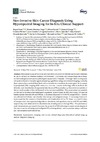Identificador persistente para citar o vincular este elemento:
https://accedacris.ulpgc.es/jspui/handle/10553/73595
| Title: | Non-invasive skin cancer diagnosis using hyperspectral imaging for in-situ clinical support | Authors: | León Martín, Sonia Raquel Martínez Vega, Beatriz Fabelo Gómez, Himar Antonio Ortega Sarmiento, Samuel Melián, Veronica Castaño, Irene Carretero, Gregorio Almeida Martín, Pablo Julio García Romero, Leví Aday Quevedo Gutiérrez, Eduardo Gregorio Hernandez, Javier A. Clavo Varas, Bernardino Marrero Callicó, Gustavo Iván |
UNESCO Clasification: | 3314 Tecnología médica 320101 Oncología 320106 Dermatología |
Keywords: | Hyperspectral imaging Skin cancer Clinical diagnosis Biomedical optical imaging Medical diagnostic imaging |
Issue Date: | 2020 | Journal: | Journal of Clinical Medicine | Abstract: | Skin cancer is one of the most common forms of cancer worldwide and its early detection its key to achieve an effective treatment of the lesion. Commonly, skin cancer diagnosis is based on dermatologist expertise and pathological assessment of biopsies. Although there are diagnosis aid systems based on morphological processing algorithms using conventional imaging, currently, these systems have reached their limit and are not able to outperform dermatologists. In this sense, hyperspectral (HS) imaging (HSI) arises as a new non-invasive technology able to facilitate the detection and classification of pigmented skin lesions (PSLs), employing the spectral properties of the captured sample within and beyond the human eye capabilities. This paper presents a research carried out to develop a dermatological acquisition system based on HSI, employing 125 spectral bands captured between 450 and 950 nm. A database composed of 76 HS PSL images from 61 patients was obtained and labeled and classified into benign and malignant classes. A processing framework is proposed for the automatic identification and classification of the PSL based on a combination of unsupervised and supervised algorithms. Sensitivity and specificity results of 87.5% and 100%, respectively, were obtained in the discrimination of malignant and benign PSLs. This preliminary study demonstrates, as a proof-of-concept, the potential of HSI technology to assist dermatologists in the discrimination of benign and malignant PSLs during clinical routine practice using a real-time and non-invasive hand-held device. | URI: | https://accedacris.ulpgc.es/handle/10553/73595 | ISSN: | 2077-0383 | DOI: | 10.3390/jcm9061662 | Source: | Journal of Clinical Medicine [ISSN 2077-0383], v. 9 (6), 1662 |
| Appears in Collections: | Artículos |
WEB OF SCIENCETM
Citations
77
checked on Jun 8, 2025
Page view(s)
184
checked on Mar 15, 2025
Download(s)
180
checked on Mar 15, 2025
Google ScholarTM
Check
Altmetric
Share
Export metadata
Items in accedaCRIS are protected by copyright, with all rights reserved, unless otherwise indicated.
